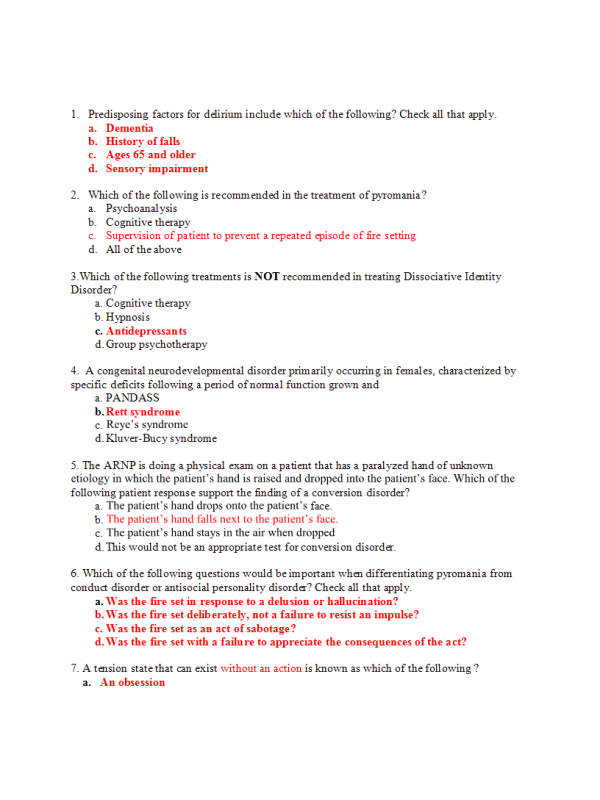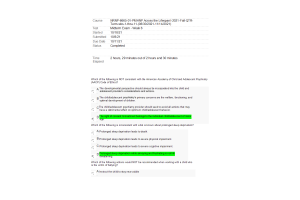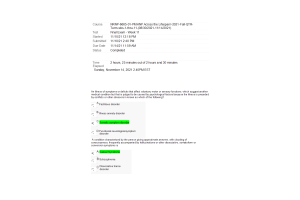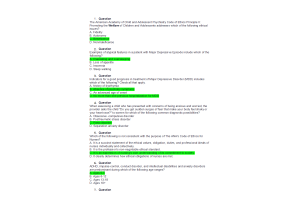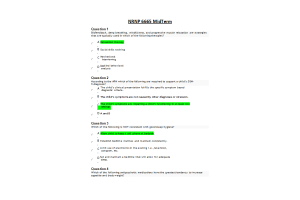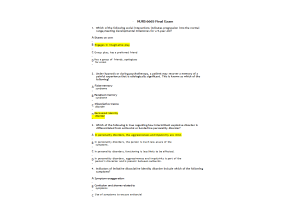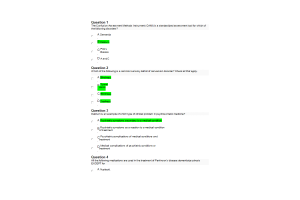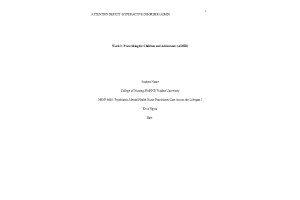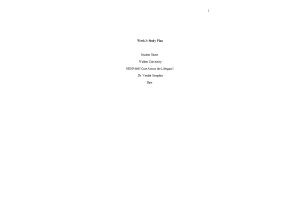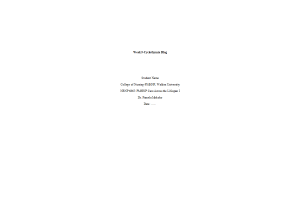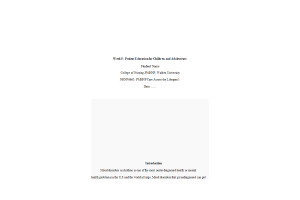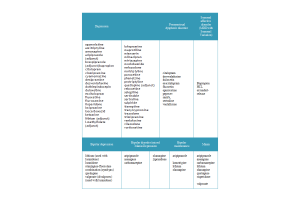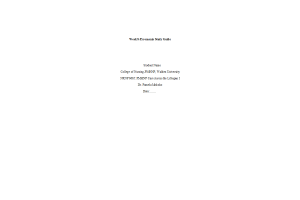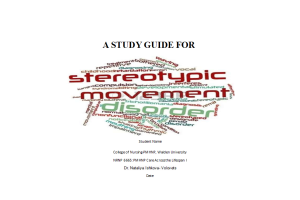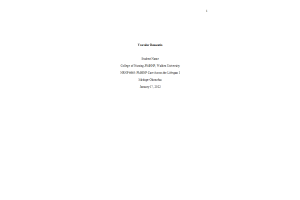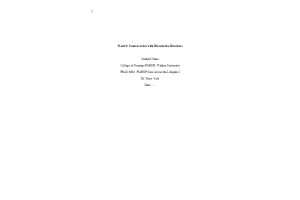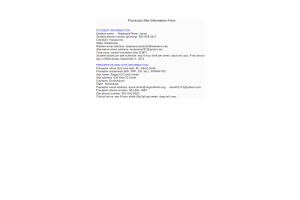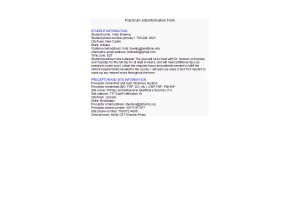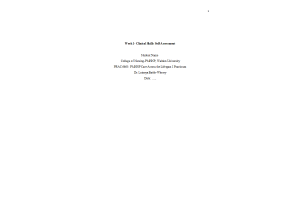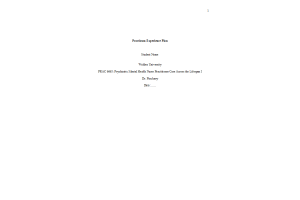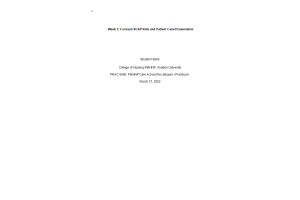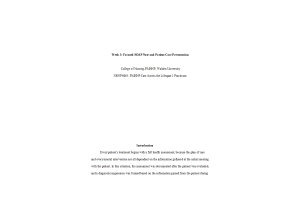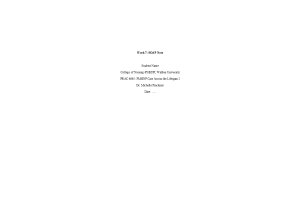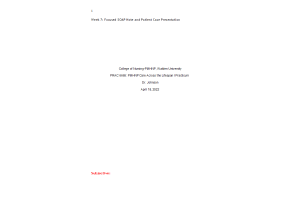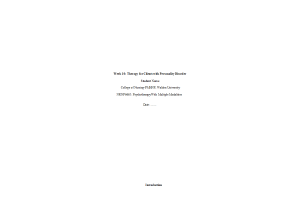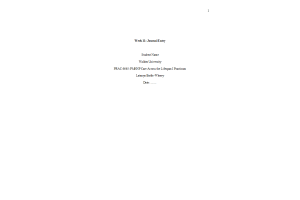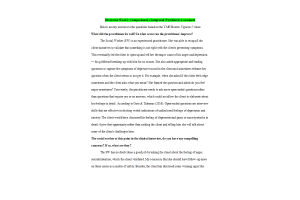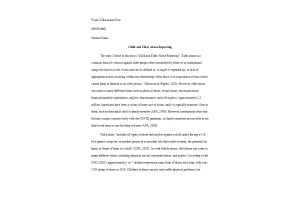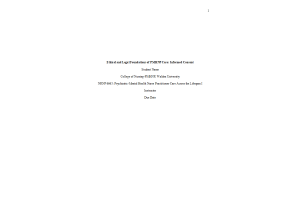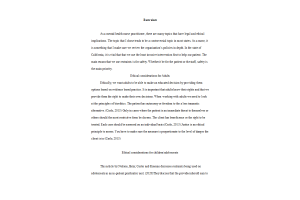NRNP 6665 Week 11 Final Exam Solutions
- $59.00
- Question: Predisposing factors for delirium include which of the following? Check all that apply.
- Question: Which of the following is recommended in the treatment of pyromania?
- Question: Which of the following treatments is NOT recommended in treating Dissociative Identity Disorder?
- Question: A congenital neurodevelopmental disorder primarily occurring in females, characterized by specific deficits following a period of normal function grown and
- Question: The ARNP is doing a physical exam on a patient that has a paralyzed hand of unknown etiology in which the patient’s hand is raised and dropped into the patient’s face. Which of the following patient response support the finding of a conversion disorder?
- Question: Which of the following questions would be important when differentiating pyromania from conduct disorder or antisocial personality disorder? Check all that apply.
- Question: A tension state that can exist without an action is known as which of the following?
- Question: The term psychosomatic literary refers to which of the following?
- Question: Which of the following is consistent with what is known about treating individuals with kleptomania?
- Question: Which of the following is an example of a medical complication of psychiatric conditions or treatment?
- Question: A process by which repressed material is brought back to consciousness and the person relives the repressed material accompanied by
- Question: The diagnosis formerly known as multiple personality disorder is now known as which of the following?
- Question: A frontotemporal dementia with onset in the fifth to sixth decade of life, more common in men, marked by personality change and cognitive decline, is known as which of the following?
- Question: Which of the following is not consistent with what is known about depersonalization and derealization?
- Question: Which of the following is consistent dementia in HIV?
- Question: Precipitating factors for delirium do NOT include which of the following?
- Question: An unconscious defense mechanism involving the segregation of any group of mental or behavioral processes from the rest of the person’s psychic activity is known as which of the following?
- Question: Which of the following medications is used to treat irritability in autism?
- Question: The ARNP is meeting with a person who reports a fascination with fire, along with recurrent deliberate and purposeful setting of fires. The ARNP realizes that these behaviors are consistent with which of the following disorders?
- Question: Which of the following are common disorders that must be differentiated from dissociative identity disorder? Check all that apply.
- Question: There is a significant overlap in symptoms of dementia and delirium, however the distinguishing feature is which of the following?
- Question: Which of the following is true about impulses? Check all that apply.
- Question: Persons who continually use the internet to play games to the extent that it interferes with social relations and work performance are exhibiting symptoms most specifically consistent with which of the following conditions?
- Question: Which of the following supports a good prognosis for a person with a conversion disorder?
- Question: Which of the following speech and language skills are consistent with normal developmental milestones of a 3-year-old?
- Question: A disorder characterized by 6 or more months of general and no delusional preoccupations with fears of having a serious disease based on a person’s misinterpretation of bodily symptoms that cause significant distress and impairment in one’s life is
- Question: An acute onset, short-term confusion, with changes in cognition and level of awareness due to physiological cause is known as which of the following?
- Question: The therapeutic approach that has the best chance of success for the person with intermittent explosive disorder is which of the following?
- Question: Which is NOT consistent with what is known about Ganser Syndrome?
- Question: Which of the following biological factors have been associated with kleptomania? Check all that apply.
- Question: Which of the following medications are FDA-approved medications for the treatment of delirium?
- Question: A child 0-3 months would be expected to be able to do which of the following?
- Question: A child who demonstrates repetitive significant violations of social rules and the rights of others over the course of a year would likely be diagnosed with which of the following diagnosis?
- Question: A tension state that always has an action component is known as which of the following ?
- Question: An increase in depersonalization is seen with the depletion of which of the following?
- Question: Which of the following can lower a person’s resistance to control impulse?
- Question: The ARNP notices that a patient with a conversion disorder unable to walk has an inappropriate cavalier attitude toward what seems to be a major impairment and recognizes this an associated psychological symptom known as which of the following?
- Question: Which of the following adoptive skills are consistent with normal range developmental milestone of an 18-month-old?
- Question: Most patients with dissociative identity disorder meet criteria for which of the following?
- Question: Patients who simulate, induce or aggravate illness to receive medical attention, regardless of whether or not they are ill, would be diagnosed with which of the following disorder?
- Question: The primary causative factor of disruptive, impulse-control, and conduct disorder is which of the following?
- Question: Anxiety related to chemotherapy is an example of which type of clinical problem in psychosomatic medicine?
- Question: Interest in fires and deliberate setting of fires for financial gain is known as which of the following?
- Question: A subcortical dementia characterized by motor abnormalities including psychomotor slowing, choreoathetoid movements, executive dysfunction complicated by impaired language, memory, and insight later in the disease process is
- Question: Depression secondary to interferon treatments represent which of the following clinical problems in psychosomatic medicine?
- Question: Indicators of imitative dissociative identity disorder include which of the following symptoms?
- Question: The principal theoretician to bring psyche and soma together was which of the following?
- Question: The epidemiology related to kleptomania includes which of the following?
- Question: MRI findings in patients with intermittent explosive disorder may reveal changes to which area of the brain that is associated with loss of impulse control?
- Question: A patient presents reporting acute amnesia and fugue episodes in addition to recurrent blackouts, unexplained possessions, and fluctuations in skills, habits, and knowledge. The ARPN recognizes this is consistent with which of the following?
- Question: The symptom of giving approximate answers is known as which of the following?
- Question: Experiences of depersonalization and derealization are common in which of the following patients?
- Question: A person who has been raped, presents with the inability to recall important personal information and any information about the rape, does not recall events prior and since. There does not appear to be any psychological reason for this. This presentation is consistent with which of the following diagnoses?
- Question: Which of the following is a common sensory deficit of conversion disorder? Check all that apply.
- Question: Which of the following statements is consistent with literature about the epidemiology of pyromania?
- Question: A person erroneously believes they sustained an emotional or physical trauma in early life is known as which of the following?
- Question: Which of the following is consistent with brain-imaging findings related to Autism Spectrum Disorder (ASD)?
- Question: Which of the following is not consistent with what is known about the epidemiology of dissociative fugue?
- Question: Which of the following is recommended as a first line therapy for a patient with dementia and behavioral disturbance?
- Question: A neurodevelopmental disorder characterized by impairment confined to a specific area of academic achievement (i.e reading, writing, and adaptive behaviors is
- Question: Deficits in attention and the ability to complete multi-step commands are associated with impairment in which of the following regions of the brain?
- Question: Genetic, imaging, and pharmacological studies support the hypothesis that ADHD is based on which of the following?
- Question: Which of the following conversion disorder symptoms are associated with a good prognosis?
- Question: Which of the following questions are recommended to assess sexual identity in a male adolescent?
- Question: Which of the following would NOT be included in the treatment plan for a patient with illness anxiety disorder?
- Question: Depression secondary to interferon treatments represents which of the following clinical problems in psychosomatic medicine?
- Question: According to a psychodynamic perspective, depersonalization and derealization are understood as which of the following?
- Question: Which of the following are behavioral red flags for a 6–12-year-old?
- Question: Which of the following is consistent with current literature about the relationship between obstetrical complications and Autism Spectrum Disorders (ASD)?
- Question: Which of the following would not be included in the treatment plan for a patient with illness anxiety disorder
- Question: Recognizable skills or abilities that have an expected range and order of appearance such as a child taking his first step around the time of his first birthday is known as which of the following?
- Question: Which of the following can cause delirium? Check all that apply.
- Question: A disorder characterized by the presence of two or more distinct identities which differ from each other in that each presents as having its own pattern of perceiving, relating to, and thinking about the environment and self.
- Question: Which of the following speech and language skills are consistent with normal developmental milestones of a 3-year-old?
- Question: Acute withdrawal from alcohol represents which type of clinical problem in psychosomatic medicine?
- Question: A person reveals to the ARNP that they steal to get the things they want and cannot afford. The person says they just can’t help themselves, because they hav]=[]==. The ARNP realizes the following:
- Question: Category of disorders characterized by the inability to resist an intense impulse, drive, or temptation to perform a particular act that is obviously harmful to self or others or both is known as which of the following?
- Question: Epidemiology data suggests which of the following with respect to illness anxiety disorder?
- Question: Which is NOT consistent with what is known about Ganser syndrome?
- Question: The term psychosomatic literally refers to which of the following?
- Question: Which of the following questions would be important when differentiating pyromania from conduct disorder or antisocial personality disorder? Check all that apply.
- Question: A type of delirium characterized by cycling through psychomotor agitation and retardation, from apathy to hypervigilance is known as which of the following?
- Question: Which of the following is true about compulsions?
- Question: According to the DSM-5 which of the following symptoms differentiates illness anxiety disorder from somatic symptom disorder?
- Question: An illness of symptoms or deficits that affect voluntary motor or sensory functions, which suggest another medical condition but that is judged to be caused by psychological factors because the illness is preceded by conflicts or other stressors in known as which of the following?
- Question: Question: An increase in depersonalization is seen with the depletion of which of the following?
- Question: A patient who has been raped, presents with the inability to recall important personal information and any information about the rape, does recall events prior and since. There does not appear to be any physiological reason for this. This presentation is consistent with which of the following diagnoses?
- Question: Patients with kleptomania have a high lifetime comorbidity of which of the following disorders?
- Question: The primary causative factor of disruptive, impulse-control, and conduct disorders is which of the following?
- Question: Which of the following is consistent with what is known about treating individuals with kleptomania?
- Question: Which of the following is consistent with normal range gross motor developmental milestones for a 4-year-old?
- Question: A child who demonstrates repetitive significant violations of social rules and the rights of others over the course of a year would likely be diagnosed with which of the following diagnoses?
- Question: A person erroneously believes they sustained an emotional or physical trauma in early life is known as which of the following?
- Question: Genetic imaging, and pharmacological studies support the hypothesis that ADHD is based on which of the following?
- Question: Depersonalization can result from which of the following conditions? Check all that apply.
- Question: According to a psychodynamic perspective, depersonalization and derealization are understood as which of the following?
- Question: According to a psychodynamic perspective, depersonalization and derealization are understood as which of the following?
- Question: Which of the following approaches/treatments are recommended in working with patients with a conversion disorder?
- Question: Deficits in language including naming, repetition, reading and comprehension, and writing is NOT associated with impairment in which of the following regions of the brain?
- Question: Deficits in attention and the ability to complete multi-step commands are associated with impairment in which of the following regions of the brain?
- Question: Which of the following social interactions indicates progression into the normal range, meeting developmental milestones for a 5-year-old?
- Question: All the following medications are used in the treatment of Parkinson’s disease dementia/psychosis EXCEPT for
- Question: The ARNP is working with the family of a patient with Alzheimer’s Disease who keeps stating the family is plotting against her, trying to have her “snuffed out.” The family is distraught because they state they are doing their best to make sure their family member is safe. The ARNP explains which of the following in educating the patient about the patient’s
- Question: The temporary marked alteration in the state of consciousness or by the customary sense of personal identity without the replacement by an alternate sense of identity is known as which of the following?
- Question: Anxiety related to chemotherapy is an example of which type of clinical problem in psychosomatic medicine?
- Question: An episode of acute violent behavior for which the person claims amnesia is known as which of the following?
- Question: Which of the following is true regarding how intermittent explosive disorder is differentiated from antisocial or borderline personality disorder?
- Question: Which of the following medications are FDA-approved medications for the treatment of delirium?
- Question: Which of the following diagnostic instruments for Autism Spectrum Disorder is recommended for universal clinical practice?
- Question: The patient presents reporting acute amnesia and fugue episodes in addition to recurrent blackouts, unexplained possessions, and fluctuations in skills, habits, and knowledge. The ARNP recognizes this is consistent with which of the following?
- Question: Which of the following is consistent with current literature about the relationship between obstetrical complications and Autism Spectrum Disorders (ASD)?
- Question: Functional neurological symptoms disorder is also known as which of the following?
- Question: A major neurocognitive disorder with severe impairment in memory, judgment, orientation, and cognition is known as which of the following?
- Question: The ARNP recognizes which of the following when the 2-month-old opens her mouth when she sees a bottle.
- Question: Which of the following is consistent with what is known about electroconvulsive therapy (ECT) use in patients with Dissociative Identity Disorder (DID)?
- Question: The recurrent failure to resist impulses to steal objects not needed for personal use or monetary value is an essential feature of which of the following disorders?
- Question: Difficulty with immediate memory is attributed to impairment in which of the following regions of the brain? Select all that apply.
- Question: The patient with an illness anxiety disorder is requesting medication only from the ARNP. The ARNPs response about pharmacotherapy in illness anxiety disorder would include which of the following?
- Question: The ARNP in working with a parent of a 6-month-old would offer which of the following in anticipatory guidance?
- Question: Condition characterized by the person giving approximate answers, with clouding of consciousness, frequently accompanied by hallucinations or other dissociative, somatoform or conversion symptoms is
- Question: Which of the following would demonstrate the normal achievement of gross motor developmental milestone for a 6-month-old?
- Question: Which of the following would demonstrate the normal achievement of gross motor developmental milestone for a 6-month-old?
- Question: Type of delirium characterized by psychomotor retardation and apathy is known as which of the following?
- Question: Which of the following is NOT consistent with what is known about intermittent explosive disorder across the lifespan?
- Question: Disorder characterized by 6 or more months of general and no delusional preoccupations with fears of having a serious disease based on a person’s misinterpretation of bodily symptoms that causes significant distress and impairment in one’s life is
- Question: A precipitous onset prion disease, with rapid decline, progressing to death within 6 months of onset is known as which of the following?
- Question: Visual hallucinations are associated with impairment in which of the following regions of the brain?
- Question: A sudden unexpected purposeful travel away from home with inability to recall all of one’s past accompanied by confusion about personal identity not due to direct effects of a substance or a general medical condition which causes clinically significant distress or impairment in social, occupational, or other important areas of functioning is most specifically known as which of the following?
- Question: Which of the following demographics are consistent with autism spectrum disorder (ASD)
- Question: Identifying developmental milestones is an important skill set for ARNPs for which of the following reasons?
- Question: Which of the following is not consistent with what is known about depersonalization and derealization?
- Question: Patient presents with persistent feelings of detachment from one’s self, like watching one’s self in a movie. The ARNP recognizes this as which of the following?
- Question: The second-most common type of dementia caused by cardiovascular and cerebrovascular disease with progressive cognitive decline in stepwise fashion is known as which of the following?
- Question: Which of the following stimulants are difficult to abuse?
